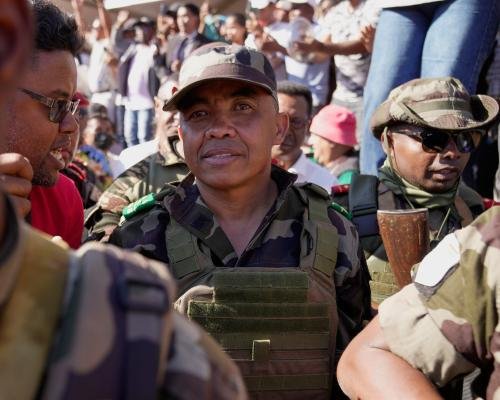Madagascar’s political crisis deepened dramatically on Tuesday after the army seized power, saying it had stepped in to restore order following the impeachment and flight of President Andry Rajoelina.
Colonel Michael Randrianirina, a senior commander in the Malagasy army, announced on national radio that the military had “taken power” and would suspend several key state institutions, leaving only the National Assembly functioning. “The armed forces have taken responsibility for leading the nation,” he declared, adding that a military-led transitional committee would govern for up to two years before organizing new elections.
According to the army’s statement, the Senate, High Constitutional Court, Independent National Electoral Commission, High Court of Justice, and High Council for Human Rights and Rule of Law were all suspended. The move, described by analysts as a “soft coup,” follows weeks of youth-led protests that swept across Madagascar demanding Rajoelina’s resignation.
The demonstrations, driven largely by Generation Z activists frustrated by corruption, unemployment, and rising prices, had gained momentum as parts of the military began defecting. For weeks, protesters flooded the streets of Antananarivo, chanting “Rajoelina must go!” as tensions escalated between the presidency and parliament.
Earlier in the day, the 51-year-old president reportedly attempted to dissolve the National Assembly by decree in an effort to cling to power. But lawmakers went ahead with an impeachment vote, plunging the country into a constitutional standoff that the military quickly exploited.
Also TRead; Gold Exports Boost Tanzania’s Economic Prospects
By nightfall, Colonel Randrianirina appeared before reporters, flanked by uniformed officers, to confirm the new leadership structure. “This is not a coup,” he insisted. “It is a corrective action to stabilize the nation.” He promised that the military’s role would be temporary and that elections would be held once the country was “ready for peace and order.”
Rajoelina’s exact whereabouts remain unknown, though unconfirmed reports suggest he may have fled the country by private jet. His office has yet to issue a statement, and his loyalists have condemned the military’s actions as an “illegal power grab.”
Regional bodies and international observers reacted swiftly. The African Union announced it would suspend Madagascar’s membership “until constitutional order is restored.” Meanwhile, the United Nations expressed “deep concern” and urged restraint from all sides, calling for dialogue to avoid bloodshed.
Rajoelina’s fall marks a stunning reversal for a man who once came to power through a similar military-backed uprising in 2009 before returning to office through elections in 2019. His presidency had been increasingly marred by allegations of authoritarianism and corruption.







